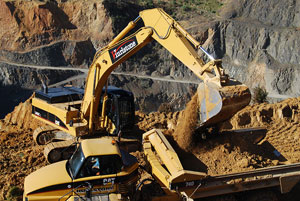Quarry Worker
Tasks & duties

Quarry workers may do some or all of the following:
-
carry out safety checks on quarry machinery, equipment and vehicles, and the area that is being excavated
-
maintain and operate quarry machinery, equipment and vehicles
-
prepare and maintain roadways within the quarry
-
drill holes, and place and detonate explosives
-
extract minerals, rock or stones from the quarry
-
take ore, rock or dust samples
-
keep records of quarry production
-
weigh trucks on a weighbridge
Skills & knowledge

Quarry workers need to have:
-
knowledge of quarrying methods and products
-
knowledge of the layout of the quarry
-
knowledge of health and safety rules and procedures
-
driving and machine operating skills
-
good listening and communication skills
-
practical skills to maintain equipment
Entry requirements
There are no specific requirements to become a quarry worker. However, a heavy vehicle licence is an advantage.
Further information on driver licensing is available from Land Transport New Zealand, which also provide a list of Approved Courses For Occupational Drivers.
Some employers may prefer you to complete an apprenticeship and gain a National Certificate in Extractive Industries. For more information about apprenticeships contact the Extractive Industries Training Organisation (EXITO).
Quarry worker apprenticeships are part of the Modern Apprenticeship scheme, which are for people aged 16 to 21. For further information visit the Modern Apprenticeships website.
Secondary education
There are no specific secondary education requirements; however, School Certificate or NCEA equivalent English and maths are helpful.
Training on the job
Almost all skills are learned on the job, and further education and training is available through the Extractive Industries Training Organisation (EXITO).
Useful experience
Experience driving heavy vehicles or working with earthmoving machinery is useful, as is experience maintaining them. Any work that involves manual labour, such as mining, or building construction, can also be helpful.
Related courses
Mining and Resources Engineering
For more information, please refer to Career Services.
Document Actions
